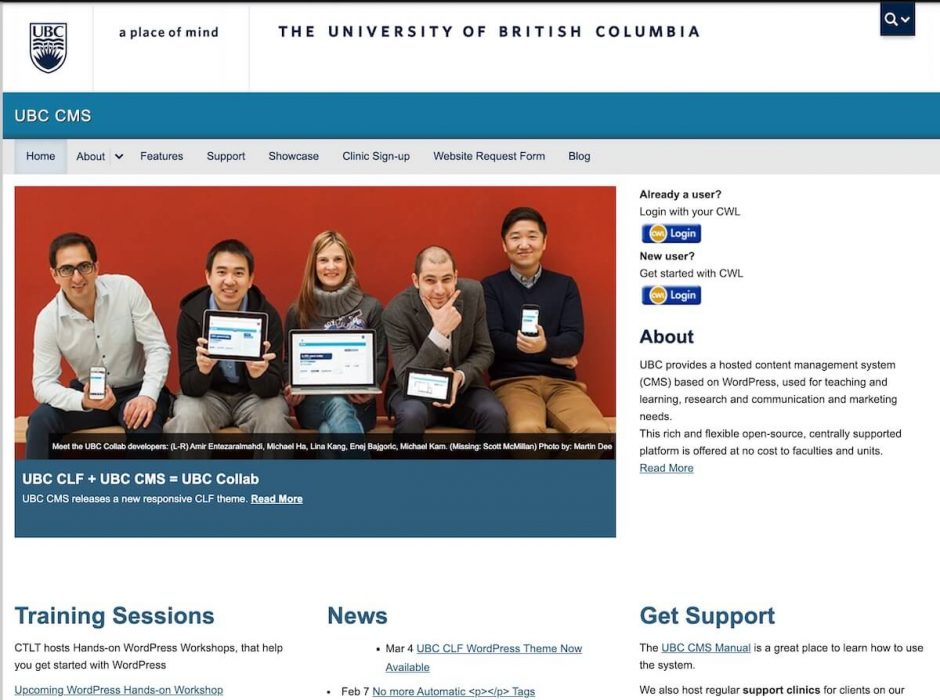The past, present and future of the UBC CMS Service
CMS Initiative at UBC
As of 2023, UBC CMS has been a part of the Web landscape at UBC for more 14 years. What started as a collaboration between what was known as the Office of Learning Technology — OLT (which, fun fact, is why canonical URLs on CMS all have olt.ubc.ca in their URL) — now the Centre for Teaching, Learning, and Technology (CTLT), Central Communications and Marketing (now Brand and Marketing) and UBC IT (now… UBC IT), CMS has evolved into a project that serves nearly every faculty or department across the university, involves several departmental support teams, and accounts for a large percentage of the public web presence for UBC.

It’s initial stated goals were to
- Provide a centrally-provisioned service to enable the creation of UBC websites that collectively portray a professional web presence for the university
- Establish a set of common web technology platforms to enable integration of web services
- Support the producers and maintainers of UBC websites by building connections and fostering collaboration between people.
And finally, the stated vision of CMS in 2009/10, was “to provide a baseline content management solution for units who are looking for a cost-effective framework of support for managing their websites. The service is free, CLF-enabled and available to you immediately”.
CMS Today
As of today, in early 2023, CMS hosts somewhere around 85-90% of the public facing websites at UBC (more than 1,500 domain mapped sites and more than 4,250 in total), for nearly every faculty and department, across all campuses. Sites on CMS cover a wide gamut of purposes from administrative and marketing, through documentation, intranet-like, and research. Most Teaching and Learning websites have been moved from CMS onto other platforms such as UBC Blogs.
In aggregate, websites on CMS receive (tens of) millions of page views each year, from every continent (yes, even Antarctica), and almost every country on Earth. (editor’s note: perhaps we need to get someone from the International Space Station to visit a CMS-hosted website?)
The team that manages CMS have made thousands of updates to the platform over the years; from plugins and themes, WordPress itself to the infrastructure layer. The team have dozens of publicly published plugins, have contributed code to WordPress core, have helped organize and speak at WordPress conferences, produced workshops, screencasts, and facilitated hundreds of weekly help clinics.
CMS, on the surface at least, hasn’t changed a great deal in the last few years. But we’ve been setting CMS up for the future…
The Future of CMS
2023 will bring several new changes to CMS – including the redesign of this website – and as such we’ll now be posting a public roadmap and changelog (just like we do with the H5P Open Hub which launched early last year).
We are collaborating with several units on producing commonly used block patterns, helping you create content in a more stylistically pleasing – and UBC brand approved – way. Those will be published to this website allowing you to copy and paste them into your own site.
A new fully-accessible, performant WordPress theme is on the horizon that fully integrating many of the powerful new features of the WordPress Block Editor. (Note: The current theme is also WCAG 2.0AA compliant)
And we’re exploring ways to modernize the infrastructure layer, ensuring your sites’ performance and availability continue to be at (or improve) the levels we’ve maintained over the last decade+.
reCAPTCHA
This site uses Google reCAPTCHA to prevent spam form submissions inline with Google’s Terms of Service and Privacy Policy.